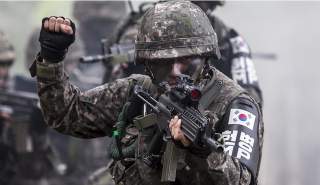The Simple Reason North Korea Keeps Bringing the World to the Edge of War
Rockets, gunboats and torpedoes are tools of Pyongyang’s diplomatic trade.
South Korea fired a total of 80 155-millimeter shells at North Korean positions, but a damage assessment conducted later suggested that none of shells hit their targets.
Two South Korean marines and two civilians died in the exchange. Fifteen marines sustained wounds. Had the first barrage not targeted the marines, civilian casualties would likely be far worse. The pause between barrages gave civilians enough time to rush to hardened underground shelters.
Why did the North do it? Robert Kelley, a professor at the University of Busan, theorized it was because of all the favorable press South Korea received for hosting the G-20 summit that month in Seoul.
Events such as the summit highlight the huge economic disparity between the two countries. For Pyongyang, that’s enough to begin shelling South Korea.
Strength, Power and Terror:
If all of the above seems a little crazy, then it’s because we’re applying an outsider’s logic to behavior that’s internally logical to a North Korean official.
The common thread driving these provocations—and the nuclear testing, the gulags, the repression of the North Korean people and virtually everything else about the state—is insecurity. Fear of being overthrown from within or invaded from outside.
In short, the leadership is deeply insecure about its own safety. But it understands the language of strength, power and terror—because the leadership sits atop a society ruled by these forces. It doesn’t work as well as the leaders would ideally like, but it works to an extent.
This is not to excuse any of these terrible things, but it’s to say they have their reasons.
In this sense, the North Korean regime is very rational, and their leaders are definitely not crazy. To call the successive Kim regimes crazy is to give up on understanding them—and dealing with them.
This first appeared in WarIsBoring here.
Image Credit: Creative Commons.

